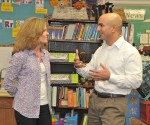A Republican gubernatorial candidate proposed a plan Tuesday to create programs that would provide free tuition to science, technology, engineering or mathematics students, add significantly more online courses to public universities and allow students from other higher education systems to take courses from the University of California and the California State University.
Neel Kashkari, a former assistant secretary of the U.S. Treasury who is running for California governor, said in a statement he thinks college tuition has risen too much during current Gov. Jerry Brown’s term and too few students graduate from a public university on time. To address this, he proposed a four-part plan for the state’s higher education systems.
Kashkari proposed linking higher education institutions’ performance on criteria like graduation rates to state funding to motivate colleges to improve their performance.
Within four years, 20 percent of courses at all UC and California State University campuses should be available online to provide students with greater flexibility in completing necessary coursework on time, Kashkari proposed in his statement.
His plan suggests allowing all students from California public colleges to take UC and CSU classes for credit to increase access and improve graduation rates.
Kashkari also outlines a new model that would provide four-year STEM college students with free tuition in exchange for a portion of their future income. This idea is based off of the model in Oregon that allows students to attend college for free if they agree to pay 3 percent of their annual salaries for 24 years.
“We cannot rebuild the middle class by making minor changes. Bold action is necessary to equip every Californian with the skills they need to build a better life for themselves,” Kashkari said in his proposal.
But his proposal for higher education calls for a set of actions that the government has no control over, so it may be difficult to implement some of the ideas, said John Rogers, an associate professor of education and director of UCLA’s institute for Democracy, Education, and Access.
Although the plan is interesting, Rogers said the governor would have limited power to enact an increase in online courses in the UC system, allow cross-university enrollment or implement a new tuition model because these issues are controlled by the UC Board of Regents.
The University has no comment on Kashkari’s proposal because UC officials do not know enough about it, said Dianne Klein, a UC spokeswoman.
Jessica Ng, a spokeswoman for Kashkari’s campaign, said these changes in higher education would require working with the legislature.
Although there would be resistance to his plan, she said she thinks Kashkari would be able to bring people together who want to implement the changes to give students greater access to higher education.
According to a poll released Wednesday, 2 percent of voters plan to vote for Kashkari, while 46 percent plan to vote for Brown, who currently has a large base of support and public approval.
The poll also reveals that 9 percent of voters plan to vote for Republican candidate Tim Donnelly, while 3 percent plan to vote for Republican candidate Andrew Blount.
Voters will cast their ballots in the state primary election on June 3.
